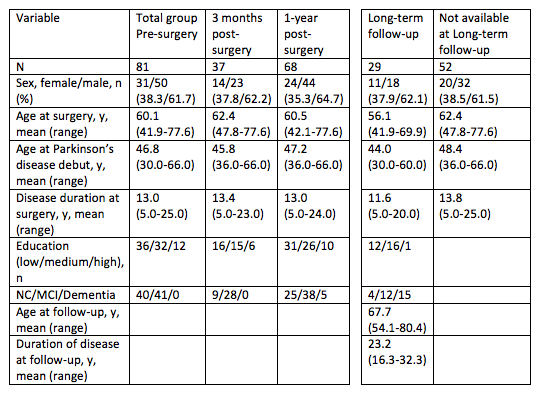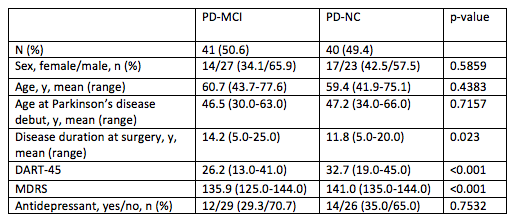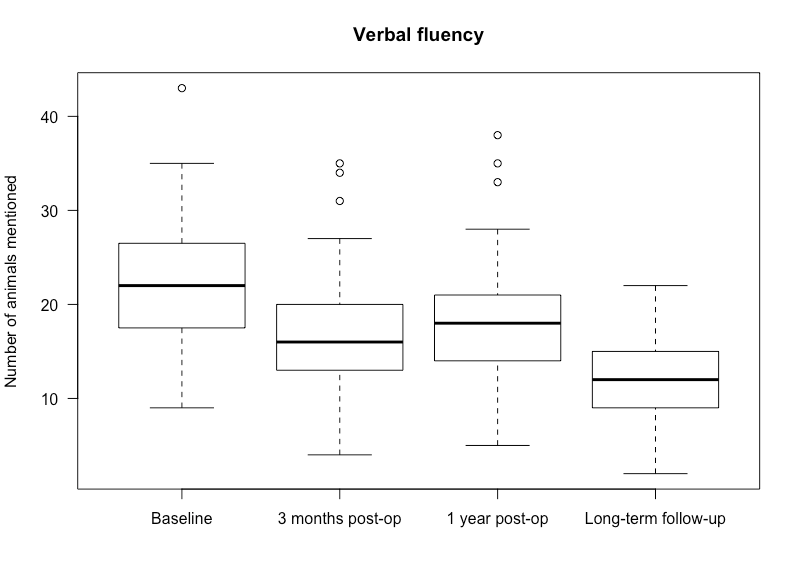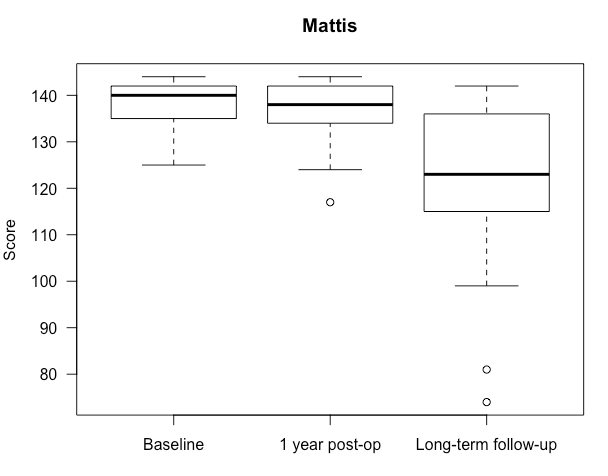Category: Surgical Therapy: Parkinson's Disease
Objective: To evaluate long-term effects of subthalamic nucleus deep brain stimulation (STN-DBS) in Parkinson’s disease (PD) on cognition.
Background: Cognitive changes are common among patients with PD. STN-DBS is believed to be cognitively safe, but some studies suggest that verbal fluency (VF) becomes affected shortly after DBS [1]. Long-term studies on cognition after STN-DBS remain scarce.
Method: A long-term follow-up of 81 patients included between 2001-2008 was performed. Patients’ demographics are described in [table1] and [table2]. See also description of follow-up in ref [2]. Neuropsychological testing included an evaluation of memory, attention, concentration, language, executive and visuo-spatial function and was carried out before surgery, 3 months and 1 year after surgery, and in a long-term follow-up (LFU) 8-15 years after surgery. Mild cognitive impairment (MCI) was determined according to level I criteria described by Litvan et al. (2012) [3]. Statistical analyses included Wilcoxon signed-rank test and logistic regression.
Results: VF was statistically significantly impaired 3 months after surgery compared to pre-surgical state (p-values 0.004, <0.001 and <0.001 respectively), while other domains remained unaffected [figure1]. However, the patients performed better in VF 1 year post-op compared to 3 months state, although no statistically significance was observed.
Cognition was significantly impaired at LFU for all tests, but VF did not stand out as specifically more impaired compared to other tests [figure2].
We found no correlation between pre-surgical MCI and the development of clinically diagnosed dementia before death or before LFU (OR 0.8, 95% CI 0.3-2.2, p = 0.714) [figure3]. The conversion to dementia was positively correlated with disease duration.
Conclusion: The decline in VF at just 3 months did not predict long term changes in VF. At LFU all tests were significantly impaired compared to pre-operative states. The presence of MCI before surgery was not correlated to the development of dementia before death or before LFU. Hence this supported the notion that STN-DBS is cognitively safe. Development of dementia was correlated to years of disease duration, which is consistent with the nature of Parkinson’s disease progression [4]. Some data of this study has previously been presented at MDS Virtual Congress 2021. Data has been updated.
References: 1. Højlund A, Petersen MV, Sridharan KS, Østergaard K. Worsening of Verbal Fluency After Deep Brain Stimulation in Parkinson’s Disease: A Focused Review. Comput Struct Biotechnol J. 2016;15:68-74. Published 2016 Nov 27.
2. Thomsen BLC, Jensen SR, Clausen A, Karlsborg M, Jespersen B, Løkkegaard A. Deep Brain Stimulation in Parkinson’s Disease: Still Effective After More Than 8 Years. Mov Disord Clin Pract. 2020;7(7):788-796.
3. Litvan I, Goldman JG, Tröster AI, et al. Diagnostic criteria for mild cognitive impairment in Parkinson’s disease: Movement Disorder Society Task Force guidelines. Mov Disord. 2012;27(3):349-356. doi:10.1002/mds.24893
4. Roheger M, Kalbe E, Liepelt-Scarfone I. Progression of Cognitive Decline in Parkinson’s Disease. J Parkinsons Dis. 2018;8(2):183-193.
To cite this abstract in AMA style:
S. Fjeldhøj, B. Thomsen, P. Pedersen, M. Karlsborg, O. Bergdal, A. Clausen, S. Jensen, B. Jespersen, A. Løkkegaard. Short and long-term effects of deep brain stimulation on cognition in Parkinson’s disease [abstract]. Mov Disord. 2023; 38 (suppl 1). https://www.mdsabstracts.org/abstract/short-and-long-term-effects-of-deep-brain-stimulation-on-cognition-in-parkinsons-disease/. Accessed December 20, 2025.« Back to 2023 International Congress
MDS Abstracts - https://www.mdsabstracts.org/abstract/short-and-long-term-effects-of-deep-brain-stimulation-on-cognition-in-parkinsons-disease/





